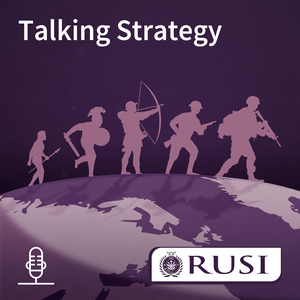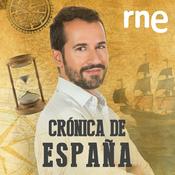88 episodios

S6E9: The Iron Chancellor: Otto von Bismarck's Unification of Germany
13/1/2026 | 32 min
Professor Michael Epkenhans describes how Otto von Bismarck's adroit use of war, realpolitik and the harnessing all levers of state power unified the German nation. Otto von Bismarck, Prussian Chancellor and – after 1871 – the leading political figure of the Second German Empire after the Kaiser, hated to be bullied but managed to manipulate and bully all around him into following his complex strategic plan. This involved not only keeping German democrats at bay but also Denmark, Austria, and France. Tricking Denmark and France into breaking conventions and declaring war on Prussia and its allies respectively, he got the other German states to close ranks and back the Prussian claim for leadership in a newly united German State. By putting Prussia on the defensive, the other European great powers – the United Kingdom and Russia – did not intervene, even though the emergent German superstate changed the balance of powers in Europe. Stopping short of aiming for overseas territories, taking on the role of the honest broker of the quarrels among others, Bismarck avoided pushing Britain and Russia over the brink into coalescing against Germany – which his immoderate successors did not. We are joined by Michael Epkenhans, Beatrice Heuser's successor as Director of Research at the Bundeswehr's Military History Research Office, and specialist on 19th century German and Prussian history.

S6E8: Prioritising Innovation: Creating a Secure and Resilient Ecosystem
06/1/2026 | 33 min
Innovation has long been a Western strategy, but how can it be made effective against an industrially and economically strong China? Dame Fiona Murray explains. A defining feature of the West's Cold War approach to the Soviet Union was leveraging its technological and economic advantages, including through 'offset strategies'. While defence innovation remains a pillar of Western security, its focus has shifted toward dual-use technologies, reflecting a broader move of the locus of innovation from states to private industry. However, just as earlier episodes in Season 5 explored (Episodes 10 and 11 regarding US industrial mobilisation during the Second World War, and Jean Monnet's plans for European post-war cooperation), success requires many actors coming together to create a resilient ecosystem. Achieving this demands alignment by all parties. Professor Dame Fiona Murray is the Chair of the NATO Innovation Fund and William Porter (1967) Professor of Entrepreneurship at the Massachusetts Institute of Technology. She advises the UK Government and sits on the European Innovation Council Joint Expert Group. Her work is published widely in Science, Nature, American Journal of Sociology, Organisation Science and the Journal of Economic Behaviour and Organisation. Her most recent book Accelerating Innovation: Competitive Advantage through Ecosystem Engagement, (MIT Press, 2025) is with Phil Budden. Further Reading Phil Budden and Fiona Murray, Accelerating Innovation: Competitive Advantage through Ecosystem Engagement, MIT Press, 2025. Edlyn V. Levine and Fiona Murray, How the US and its allies can rebuild economic security, in MIT Technology Review, 30 July 2024. Stefan Raff, Fiona E. Murray, and Martin Murmann, Why You Should Tap Innovation at Deep-Tech Startups, in MIT Sloan Management Review, Fall 2024. Gene Keselman and Fiona Murray, Dual-use is a Strategy, Not a Category (Nor a Trap), War on the Rocks, 2 January 2025.

S6E7: Strategic Transformation of the Army: General Sir Nigel Bagnall
16/12/2025 | 33 min
The National Army Museum's Justin Maciejewski reveals how General Bagnall's far-reaching reforms transformed the British Army for war against the USSR. By the 1980s, General (later Field Marshal) Sir Nigel Bagnall GCB CVO MC and bar (1927-2002) felt that British Army was ill-prepared for the fight against the Soviets. He pinpointed shortcomings such as the lack of conventional mass, the right doctrine and a personnel skills gap. Moreover, British plans did not fit with the allied armies on either flank. Bagnall sought to transform the Army and integrate it within a broader NATO approach involving changing nuclear and conventional postures, most notably the Air-Land Battle. Commissioned as an infantry officer, Bagnall was schooled in counter-insurgency warfare in Palestine, Malaya, Cyprus and Indonesia-Malaysia before becoming an armour commander in West Germany. As Chief of the General Staff, he steered many of the reforms he had initiated when commanding the British Army of the Rhine, changing the face of the Army and leaving it better prepared for war in Europe. According to Justin Maciejewski, the reforms made Bagnall the most consequential officer since the Second World War. Justin Maciejewski DSO MBE spent 27 years in the British Army before becoming a management consultant for McKinsey and then moving to the National Army Museum in London. He draws on his experience serving in the Army through the Bagnall reforms, and his time as a consultant overseeing commercial transformation programmes. Further Reading Justin Maciejewski, How the British Army's Operations Went Agile, McKinsey Quarterly, October 2019. Alexander Alderson, Influence, the Indirect Approach and Manoeuvre, RUSI Journal Vol.157:1, 2012, pp. 36-43. Ben Barry, Rise and Fall of the British Army 1975-2025, Osprey, 2025. Army, Army Doctrine Publication (ADP) 01, Operations, 1994. Beatrice Heuser: NATO, Britain, France and the FRG: Nuclear Strategies and Forces for Europe, 1949-2000 (London: Macmillan, 1997)

S6E6: Admiral Lord Horatio Nelson: Building a Warrior Culture
02/12/2025 | 34 min
Admiral Nelson instilled in his sailors a martial spirit that in many battles saw them prevail against superior odds. Dr Martin Robson discusses Nelson's legacy with us. Widely considered one of the greatest admirals, alongside Admiral Yi Sun-sin, (Season 4, Episode 6) - Vice-Admiral Horatio Nelson, 1st Viscount Nelson (1758-1805) advised: 'No captain can do very wrong if he places his ship alongside that of an enemy'. His legacy is multi-faceted, but in this episode, we seek to explore his leadership style, which might today be seen as pre-empting mission command, and his ability to create a warrior culture that delivered victory. Dr Martin Robson helps us explore how Nelson instilled this culture and what lessons in leadership remain for us today. Dr Robson is an associate professor at the University of Exeter Strategy and Security Institute, specialising in the use of history and strategic theory of the past for today. He is also a member of the Corbett Centre for Maritime Policy. He holds a PhD from the Department of War Studies, King's College London, and has experience working at the United Kingdom Defence Academy. He is the author of two volumes in the prestigious A History of the Royal Navy series, covering the Napoleonic Wars (2014) and the Seven Years War (2015), published by IB Taurus. Further Reading Martin Robson, A History of the Royal Navy: Napoleonic Wars, IB Taurus, 2014. Alfred Thayer Mahan, The Life of Nelson: The Embodiment of the Sea Power of Great Power, Little Brown, 1899. Available at: https://archive.org/details/lifeofnelsonembo01maha John Sugden, Nelson: A Dream of Glory, 1758-1797, Random House, 2005. Andrew Gordon, The Rules of the Game: Jutland and British Naval Command, John Murray, 1996.

S6E5: Strategy Amidst Complexity: Gen.(retd) Lori Robinson
18/11/2025 | 35 min
A former four-star combatant commander, General (retd) Lori Robinson, discusses the challenges of strategy making and strategic leadership in a complex environment. After 37 years of military service, Gen. Robinson retired in 2018 as commander of the United States Northern Command (USNORTHCOM) and North American Aerospace Defense Command (NORAD). This double role required her to report to both the President of the United States and the Prime Minister of Canada. Consequently, her tenure involved directly addressing strategic challenges to the US posed by both China and Russia. She was the first woman in US history to lead a combatant command. Having operated in environments of political and interagency complexity, she discusses the lessons she learned about being a successful strategic leader, working with politicians, government departments, business leaders and allied militaries. Having retired in 2018, General Robinson is now a non-resident Senior Fellow in the Center for Security, Strategy and Technology in the Foreign Policy program at the Brookings Institution and is a director on the KornFerry Board. She was named as one of Time magazine's '100 Most Influential People'; in 2016 and one of its 'First Women Leaders' in 2017.
Más podcasts de Historia
Podcasts a la moda de Historia
Acerca de Talking Strategy
Escucha Talking Strategy, SER Historia y muchos más podcasts de todo el mundo con la aplicación de radio.es

Descarga la app gratuita: radio.es
- Añadir radios y podcasts a favoritos
- Transmisión por Wi-Fi y Bluetooth
- Carplay & Android Auto compatible
- Muchas otras funciones de la app
Descarga la app gratuita: radio.es
- Añadir radios y podcasts a favoritos
- Transmisión por Wi-Fi y Bluetooth
- Carplay & Android Auto compatible
- Muchas otras funciones de la app


Talking Strategy
Descarga la app,
Escucha.








































